I would expect nothing less from the mouth of an elitist, pro-abort feminist.
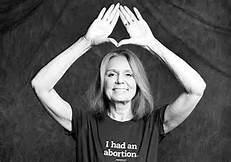
The Guardian: The pope is in town the morning I visit Gloria Steinem, staying a few blocks from her on the east side of Manhattan, a fact that tickles the 81-year-old activist. She is, needless to say, unimpressed by the pontiff’s liberal window-dressing. “I’m very glad that he cares about the environment,” she says drily. “And poverty. And dogs.” He has also relaxed the language around abortion, urging “forgiveness”, as opposed to damnation. Steinem, who is the nearest thing we have to a grande dame of feminism – a mantle she abhors – laughs. “Excuse me? Are you kidding me? Forgiveness?”
It is not easy to be an old hand in a political movement the very nature of which is, to some extent, to interrogate and reject the assumptions of what came before. When Steinem came of political age, in the late 1960s and early 70s, Betty Friedan ruled the roost, urging women to shuck off their domestic duties and grab the economic reins of power, something her feminist descendants praised even while deposing her for the reactionary scope of her interests. (As Bella Abzug said at the time, Friedan’s proposals were in danger of replacing “a white, male, middle-class elite with a white, female, middle-class elite”, a caution Steinem echoed: “We wanted to transform the system, not imitate it,” she says.)
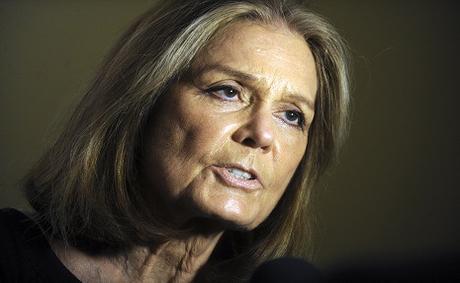
April 4, 2014 – New York, New York, USA – Gloria Steinem attends the 2014 DVF Awards at United Nations Headquarters on April 4, 2014 in New York City (Credit Image: © Future-Image/ZUMAPRESS.com)
Since then, we’ve lived through Camille Paglia, Andrea Dworkin, bell hooks and Alice Walker; Hélène Cixous and the post-structuralists; intersectionality and political lesbianism; the trans rights movement and the burgeoning of identity politics. And Naomi Wolf. Steinem is still here, in her basement apartment, dressed all in black and Hepburn-slight, with a bandaged foot. The apartment is dimly lit and warren-like, a series of rooms leading to a conservatory at the back, full of rugs and treasures she has collected on the road, and a three-legged cat that belongs to her niece. She doesn’t look 81. Her face is pale and unlined and, going over the feminist stations of the cross yet again, she is as eager as if new to the cause. The only apparent change is in her fingernails, a much-mocked Steinem trademark, always highly manicured. Today they are unpainted.
Steinem’s appearance has been an unwelcome source of interest over the years, guaranteeing attention from the mainstream media and irritating other, less high-profile feminists, whose very obscurity relative to Steinem’s underscores the criteria women must meet to enter and stay in public life. Her good looks have also been used by idiots as the exception to the rule that women turn to feminism only because they can’t get a man.
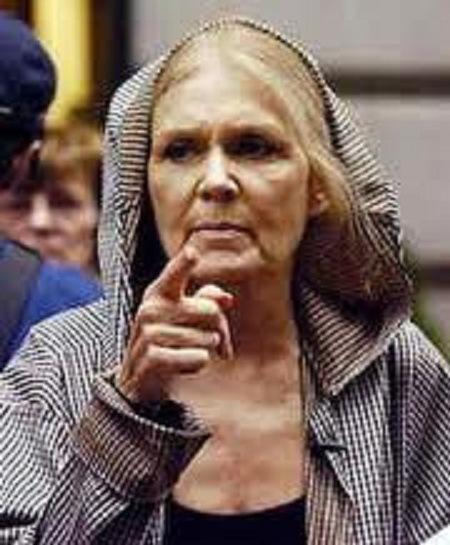
She is a figurehead without a break-out book to her name, less scary to the mainstream than many of her peers, and for that reason one might expect her to be less impressive. She is nothing of the sort. Over the course of an hour, with good humour and anger undimmed, she demonstrates the importance to fourth-wave feminism of someone with institutional memory, someone who has spent the best part of a life on the road, lobbying, canvassing and interviewing a vast range of women, rather than extrapolating political points from the specifics of her own background.
Her new book, My Life On The Road, is an account of those travels, a loose collection of tales from the anti-Vietnam rallies of the 60s to the first National Women’s Conference in Houston in 1977, to more personal stories such as the memorial, in rural Oklahoma in 2010, of Wilma Mankiller, the first woman to be elected chief of the Cherokee Nation and Steinem’s great friend. There are some outrageous moments along the way, such as when, as a young journalist, Steinem sat between the writers Gay Talese and Saul Bellow in a taxi, and told them how she planned to get Bobby Kennedy to give her good quotes in an interview. Talese leant across her, “as if I were neither talking nor present – and said to Bellow, you know how every year there’s a pretty girl who comes to New York and pretends to be a writer? Well, Gloria is this year’s pretty girl.”
Much of the overtly political stuff Steinem talks about should at this point be ancient history, a fact underlined by her dedication of the book to an obscure London physician called Dr John Sharpe who, in 1957, performed her abortion at a time when it was still illegal. Sharpe told her: “You must promise me two things. First, you will not tell anyone my name. Second, you will do what you want to do with your life.” Steinem was 22 and credits Sharpe’s act of charity for having enabled her life. The fact that, almost 60 years later, congressional hearings are still focused on a woman’s right to access not only abortion but contraception would, one imagines, be deeply depressing to Steinem. No, she says. To think that it would ever have been otherwise is naive. Strides may be made in other areas – same-sex marriage, equal pay and opportunity – but abortion will be the last issue to fall.
“It took us a while to figure out,” Steinem says, “but patriarchy – or whatever you want to call it, the systems that say there’s masculine and feminine and other bullshit – is about controlling reproduction. Every economics course ought to start not with production but with reproduction. It is way more important.”

She has a fantasy that “the pope and the head of every patriarchal, fundamentalist, orthodox religion” should be hauled into the dock for causing global warming. “Because they are forcing girls – through child marriage – to have children. Having children too young is the biggest cause of adolescent death in the world. It’s a health issue for us. So it is the fundamental political question. And it becomes even more political when there’s racism and caste or class, because the impulse to preserve [power] means you have to control who has children with whom, and how many. And this country right now is going bonkers because it’s about to become majority non-white. So the people whose identity depends on race are going crazy.”
Steinem sees racism at the heart of the evangelical attack on family planning, a political revolt posing as a spiritual one that has given rise to, among other things, the Quiverfull movement, popular among some fundamentalist Christians, “devoted to encouraging, forcing white women to have a lot of children”. The data on abortion, meanwhile, makes a mockery of the entire rightwing project. “The truth of the matter is one in three American women was having an abortion when it was illegal; and one in three is having an abortion now.” The difference being, of course, that women aren’t dying as a result of it now. Steinem says, as she must have said thousands of times over the last 40 years and with the amusement that permits her to go on, “If men could get pregnant, abortion would be a sacrament.”
Read the rest of this article here.
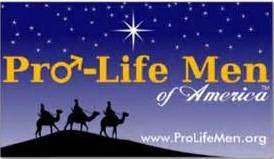
Ms. Steinem’s know-it-all, racist and sexist views disregard the fact that there are many men who are pro-life and would never define abortion as a “sacrament”. There’s a group called “Pro Life Men of America” with a mission “To honor the sanctity of life by providing support and prayer for all men, regardless of age, religious affiliation or political preference, who wish to encourage their partner, spouse, family member or friend to choose an alternative to abortion in an unplanned or difficult pregnancy.”
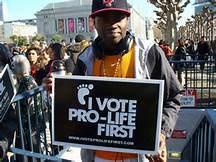
But why let that get in the way of pushing her points to sell her book.
DCG

